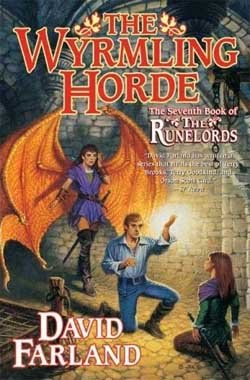SFF author David Farland gets ‘book bombed’ to help sick son.
Readers are ordering David Farland books as a means to help donate funds to save Farland’s son, who suffered life threatening injuries from a longboarding accident last week. So many readers of David Farland started ordering his books that within hours his books such as Nightingale, both in print and electronic, may soon top the Science Fiction and Fantasy genre’s bestseller list.
Authors have come forward to support Farland’s cause including Tim Powers, Kevin Anderson, Jill Rusche, Day LeClaire, Mary Robinette Kowal, Larry Corriea, J Scott Savage, and others.
Farland’s youngest son, Ben Wolverton, age sixteen, lives with Farland and his wife, Mary Wolverton. Ben is currently in intensive care, having suffered severe brain trauma from a longboading accident near their home in St. George, Utah. It’s suspected that Ben should awake from his coma, but no one knows when. He may not be able to walk, or possibly talk or see, among other repercussions. Doctors removed his skullcap to alleviate the pressure from life-threatening brain swelling. He also has bruised lungs, a broken tailbone and pelvis and his severely burnt knees need skin grafts. Add to that broken eardrums, road rash, and now, pneumonia.

For the first few hours after the accident, Ben was in grave danger of dying. Dave was deeply touched by the thousands of people who offered prayers on his son’s behalf through a grass-roots prayer chain by fans, friends, authors, whole church congregations, temple attendees and people of all faiths around the world. Word spread like electricity through the internet. Farland feels that this helped preserve his son’s life, as did the efforts of the doctors, EMT’s, life-flight crew and nurses that worked so hard to save him. Doctors now expect Ben to live and regain consciousness eventually.
Ben’s mother, Mary, said, “Ben has always been a friendly, loving, role-model and straight A student with lots of friends.” Sadly, statistics are not in Ben’s favor. Teens who suffer severe brain trauma often develop anti-social behavior, and social disabilities as well as learning disabilities after the accident. They may withdraw from their family, lose friends and cannot make new ones. Mary says, “We’ll just have to hope and pray that he fully recovers to be the person he has always been. I’d ask others to pray for him as well, and stand by him.”
Since the extent of the injuries is largely unknown, there is no estimate on the total cost of all the treatment, but severe brain trauma injuries of this nature often cost one to four-million dollars for the first few years of treatment and rehabilitation.
To learn more about Ben’s condition, go to http://www.helpwolverton.com. There is an event page set up on facebook here.
Through no fault of his own, Farland cannot obtain medical coverage due to pre-existing health conditions. His wife did have a job that allowed them to carry group health insurance, but got laid off during the worst of the recession. When asked how authors survive these kinds of disasters, Farland answered, “It’s only through people working together. People are amazingly kind in times like this.”
Farland’s son, Spencer Wolverton, started a fund for those who want to donate at Go Fund Me and that has raised some much-needed emergency funds to help continue treatment. It is unclear which of Farland’s fans started the book bomb movement, but that is also quite successful.
At this time, many sites will be taking backorders on Farland’s print books, and backorders still help, but Farland’s electronic novels never run out of stock, and they have less overhead. Farland also has some personal book inventory at DavidFarland.com. Those who wish to take part are encouraged to go to their favorite bookstore or online seller and look up David Farland.
Many people wish to help Ben but can’t afford a book or donation. They can help by going to the Gofundme page, linking to Ben Wolverton, and “liking” it on Facebook, leaving encouraging comments, offering a prayer and spreading the word, encouraging others to do the same. Share it on facebook, twitter, pinterest, a blog—anywhere to get the word out. “Everyone can take part and help at some level and become a successful part of something greater than any of us,” says young Spencer Wolverton, Ben’s teenage brother, who set up the Gofundme web page of his own initiative.
Dave would like people to know that nearly 16,000 youth seek emergency treatment from skateboarding head injuries in the US yearly (in recent years), often resulting in many cases of loss of consciousness, severe brain trauma (SBT) or death. Most SBT and deaths occur at age sixteen, 74% are male, almost all happen outside the skate park on public streets. Longboards are responsible for more deaths than other types of skateboards due to their high speeds. Most severe injuries occur within one-week of beginning skateboarding. Ninety percent of brain injuries can be avoided by wearing a helmet. A child who receives even a minor brain injury is far more likely to receive another one and the second injury is far more likely to result in SBT or death.
